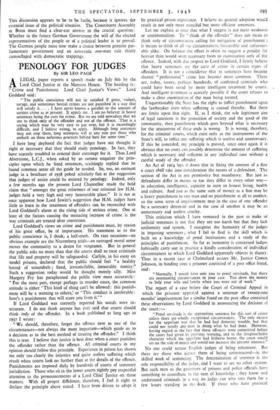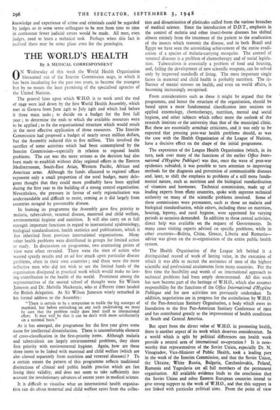PENOLOGY FOR JUDGES By SIR LEO PAGE A LEGAL paper reports
a speech made on July 6th by the Lord Chief Justice at the Mansion House. The heading is: "Crime and Punishment. Lord Chief Justice's Views." Lord Goddard said: "The public conscience will not be satisfied if gross, violent, savage, and sometimes bestial crimes are not punished in a way that will satisfy it. . . . I have never known a parallel to the amount of serious crime as at present. It appals me. I am no believer in heavy sentences being the cure for crime. But we are told nowadays that we are to think only of the offender and not of the offence. That is a saying which may be very easy to put over, but it is exceedingly difficult, and I believe wrong, to apply. Although long sentences may not stop them, long sentences will at any rate put those who embark on these nefarious practices behind bars for some time."
I have long deplored the fact that judges have not thought it right or necessary that they should study penology. In fact, they have scarcely troubled to conceal their contempt for it. Thus Lord Alverstone, L.C.J., when asked by an earnest enquirer the prin- ciples upon which he fixed sentences, scathingly replied that he found common sense all the guide he needed. So, too, an eminent judge in a brochure of 1938 poked scholarly fun at the suggestion that judges of assize could be assisted by penology. Indeed, only a few months ago the present Lord Chancellor made the bold claim that "amongst the great reformers orour criminal law H.M. judges held a very high and very honourable place." It is not at once apparent how Lord Jowitt's suggestion that H.M. judges have little to learn in the treatment of offenders can be reconciled with Lord Goddard's alarm at the rising tide of serious crime. One at least of the factors causing the menacing increase of crime is the way criminals are treated after conviction.
Lord Goddard's views on crime and punishment must, by reason of his great office, be of importance. His statement as to the public conscience is, I think, a half-truth. On rare occasions—an obvious example are the Nuremberg trials—an outraged moral sense moves the community to a desire for vengeance. But in general
the public asks no more than that the courts shall so treat criminals that life and property will be safeguarded. Carlyle, in his essay on model prisons, declared that the public should feel "a healthy hatred of scoundrels ; fixed, irreconcilable, inexorable enmity." Such, a suggestion today would be thought merely silly. Miss Margery Fry has paraphrased the public view most accurately: "For the most part, except perhaps in murder cases, the common attitude is either 'This kind of thing can't be allowed: this punish- ment will be a warning to others,' or 'This conduct is intolerable: here's a punishment that will scare you from it."
If Lord Goddard was correctly reported his words were in-
accurate. I do not think anyone has ever said that courts should think only of the offender. In a book published as long ago as
5937 I wrote: "We should, therefore, forget the offence save as one of the circumstances—not always the most important—which guide us to a decision as to the best method of treating the offender." I think this is true. I believe that justice is best done when a court punishes the offender rather than the offence. All criminal courts in my opinion should follow this principle. Experience in prison has shown me only too clearly the injustice and quite useless suffering which result when courts look no further than at the details of the offence. Punishments are imposed daily by hundreds of courts of summary jurisdiction. Those who sit in the lower courts rightly pay respectful attention to the pronouncements of a Lord Chief Justice on' these matters. With all proper 'diffidence, therefore, I feel it right to declare the prinCiple above stated. I have been driven to adopt it by practical prison experience. I believe its general adoption would result in not only more merciful but more efficient sentences.
Let me explain at once that what I suggest is not mere weakness
or sentimentalism. To "think of the offender" does not mean to
think only of circumstances calling for mitigation of punishment ; it means to think of all the circumstances, favourable and unfavour- able alike. On balance the effect is often to suggest a penalty far heavier than would seem necessary from an examination only of the offence. Indeed, with due respect to Lord Goddard, I firmly believe that heavy sentences are the cure of crime in certain types of
offenders. It is not a coincidence that as sentences have become
shorter " professional " crime has become more common. There are, today, scores, perhaps hundreds, of confirmed criminals who could have been saved by more intelligent treatment by courts. And intelligent- treatment is scarcely possible if the court refuses to make a close examination of the man being treated.
Unquestionably the State has the right to inflict punishment upon
the lawbreaker even when suffering is caused thereby. But there are limits upon that right. If, as I think, the sole legitimate aim
of legal sanctions is the protection of society and the good of the community, then punishment which goes beyond what is necessary for the attainment of these ends is wrong. It is wrong, therefore, for ,the criminal courts, which exist only as the instruments of the State's will, to inflict any suffering which is useless and unnecessary.
If this be conceded, my principle is proved, since once again it is
obvious that no court can possibly determine the amount of suffering which is necessary and sufficient in any individual case without a careful study of the offender.
An Act of 1914 lays it down that in fixing the amount of a fine
a court shall take into consideration the means of a defendant. The section of the Act is not permissive but mandatory. But just as defendants differ in means so too they differ in every other way— in education, intelligence, capacity to earn an honest living, health and culture. And just as the same sum of money as a fine may be a heavy punishment to one man and no punishment at all to another, so the same term of imprisonment may in the case of one offender be a necessary deterrent and in the case of another it may be an
unnecessary and useless cruelty.
This criticism which I have ventured in the past to make of judicial sentences is not that they are too harsh but that they lack uniformity and system. I recognise the humanity of the judges
in imposing sentences ; what I fail to find is the skill which is built on a knowledge of penal institutions and a study of the principles of punishment. So far as humanity is concerned judges
habitually carry out in practice a kindly consideration of individual circumstances to which Lord Goddard apparently objects in theory.
Thus in a recent case at Chelmsford assizes Mr. Justice Croom Johnson, in binding over a prisoner convicted of a post office fraud,
said:
"Normally, I would have sent you to penal servitude, but there are extenuating circumstances in your case. You drew the money to help your wife and family when you were out of work."
The report of a case before the Court of Criminal Appeal in which the prisoner appealed against a sentenoe of twenty-one months' imprisonment for a similar fraud on the post office contained these observations by Lord Goddard in announcing the decision of
the court :—
" Penal servitude is the appropriate sentence for this sort of crime unless there are wholly exceptional circumstances. The only excuse for the appellant was that he had had domestic trouble, but that could not justify any man in doing what he had done. However, having regard to the fact that these offences were committed before the court had given its previous warning, and to the irreproachable character which the appellant had hitherto borne, the court would err on the side of mercy and would not increase the present sentence."
No one could accuse English judges of being inhumane. But there are those who accuse them of being uninstructed—in the
skilled stork of sentencing. The determination of sentence is the
sole responsibility of the judge, and I want to see no other system. But such men as the governors of prisons and police officials have something to contribute to the sum of knowledge ; they know and understand criminals in a way no judge can who sees them for a few hours standing in the dock. If those who have practical
knowledge and experience of crime and criminals could be regarded by judges as in some sense colleagues to be met from time to time in conference fewer judicial errors would be made. All men, even judges, need to learn a technical task. Perhaps when this fact is realised there may be some place even for the penologist.



































 Previous page
Previous page